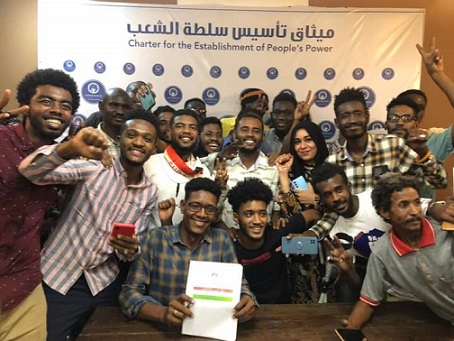Resistance committees divided over Sudan’s political process
September 8, 2022 (KHARTOUM) – Khartoum state Resistance Committees, the spearhead of the anti-coup protests, are now openly divided over the political process to restore a civilian transitional government, as some continue to oppose it while others expressed their clear support.
The neighbourhood committees which were the popular mobilization arm of the Forces for Freedom and Change (FFC) during the revolution in 2019 emancipated themselves from the political coalition during the transitional government of Hamdok and took the lead in the protest movement immediately after the coup of October 25, 2021.
Nonetheless, several RC coordination committees allegedly close to the Sudanese Communist Party (SCP) blamed the FCC groups for their complacency with the military during the past period and accused them of seeking to re-establish this partnership.
In a statement on September 6, the coordination of the Resistance Committees of South Khartoum reiterated their rejection of the FFC proposals for talks with the military component to dismantle the coup.
The coordination further emphasized their adherence to the three noes slogan (No negotiations, No partnership, no legitimacy).
This statement was issued in response to a meeting held, on the same day, by the coordination committees favourable to the political process in Central Khartoum, West Khartoum, South Khartoum, Old Omdurman East Nile, and many other areas in Khartoum state.
The Khartoum state resistance committees reiterated their rejection of any partnership with the military component.
They further stressed the “Need for tight coordination between the Resistance Committees and the political, professional and social forces that believe in democratic transition and call for the overthrow of the coup,” further read the statement.
The FFC and the SPLM-N Revolutionary Democratic Current welcomed the call by the resistance committees in Khartoum state for effective coordination between the various revolutionary components to bring down the coup.
The shift in the positions of the resistance committees towards the FFC forces enhances the position of the coalition in any political process as they had been described as isolated groups without popular support.
This development, also, intervenes after several meetings the FFC groups held with the resistance committees to explain their position toward the coup leaders.
Ahmed Ismat, a spokesman for the South Khartoum Resistance Committee, vowed that they would continue to organize protests against the coup “until the revolution slogan is fulfilled”.
Ismat further reaffirmed to Sudan Tribune their rejection of dialogue with the military component, pointing out that this process aims to safeguard the interest of the political elite, which will eventually reproduce the same crisis shortly.
“The current negotiations are an attempt to exclude the Sudanese people from participating in the political scene,” he told Sudan Tribune.
On Thursday, U.S. new ambassador to Sudan John Godfrey met with some representatives of the FFC groups to hear their position on the political crisis and ways to end it.
“I enjoyed an informative discussion with another group of youth active in Resistance Committees who described their activities and continued commitment to the goals of the 2019 revolution, including a civilian-led government,” Godfrey said in a tweet posted after the meeting.
(ST)

